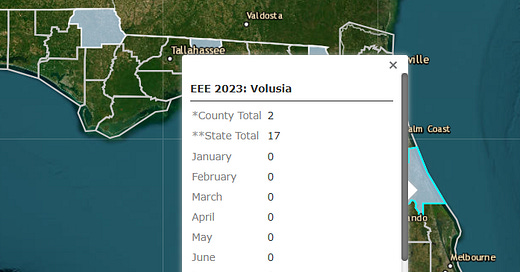Eastern Equine Encephalitis (EEE) in Florida 2023
17 horses contracted the dangerous virus
The Florida Department of Agriculture and Consumer Services (FDACS) reports 17 cases of Eastern Equine Encephalitis (EEE) in horses in the state through December 30, 2023.
This compares to 11 equine cases reported in all of 2022.
The cases this year were reported in the following counties: Polk (2), St. Johns (2), Jefferson (2), Jackson, Suwannee, Putnam, Lake (2), Baker, Highlands, Volusia (2), Marion and Levy counties.
Eastern Equine Encephalitis is a viral disease that causes inflammation of the brain and spinal cord. It is transmitted by mosquitoes.
Subscribe to Outbreak News TV on YouTube
Mosquitoes become infected when they feed on infected birds, which circulate high levels of the virus in their blood for a period of time. These mosquito species include some Aedes, Coquillettidia and Culex species.
Infected mosquitoes can then transmit the virus to humans and animals while biting to take a blood meal.
The disease is not directly transmitted between horses, from birds to horses, or from horses to humans.
Clinical signs and symptoms of EEE include the following:
Depression and anorexia; initially without a fever when initially infected
Moderate to high fever
Lack of appetite
Lethargy/drowsiness
Neurologic signs- onset of neurologic disease is frequently sudden and progressive
The only treatment available is supportive care with documented mortality rates between 70 and 95 percent.

Vaccination for EEE is highly effective and is recommended as a core vaccination.
In addition to the EEE cases in horses, Florida reported two human EEE cases —in St. John’s and Suwannee counties.
Also, positive samples from 155 sentinel chickens, one sparrow and one laughing gull were seen in 2023.





